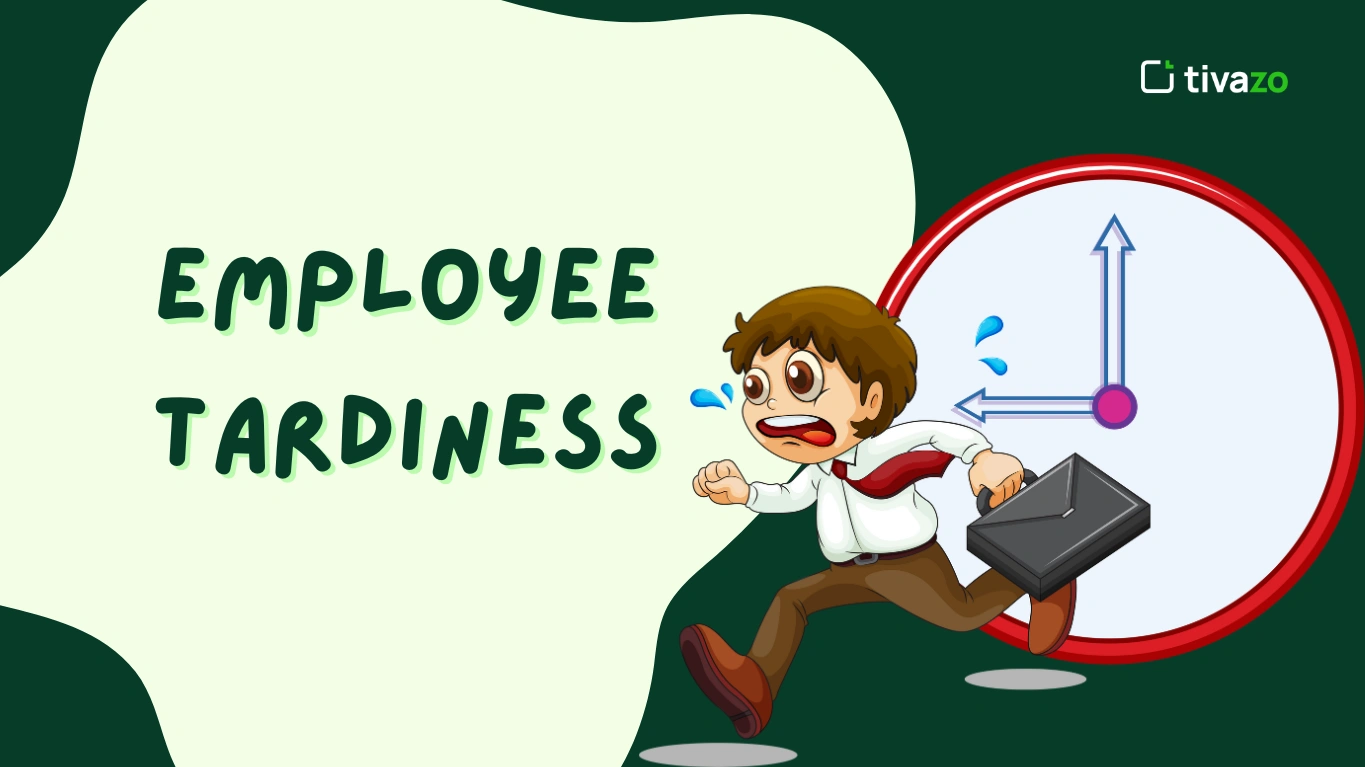One of the most simple, and yet most important professional behaviours in any organization is punctuality. Nevertheless, employee tardiness, the deliberate act of arriving to work, meetings, or other duties late or a steady habit of doing so, remains one of the most frequently occurring issues that has adverse effects on the productivity, morale, and even reputation of the organization.
In this article, we will endeavor to define what employee tardiness is among employees, its causes, its impact on any organization, as well as how employees and leaders can respond to employee tardiness and get rid of it.
What is Employee Tardiness?
Employee tardiness applies to regular employee lateness in:
- Showing up at work
- Participating in agreed-upon meetings
- Access to the systems (remote or hybrid employee)
- Delivering and turning in a task or assignment
A delay once here and there is understandable but continuous employee tardiness may be an indication of underlying issues, which could be loss of interest, lack of time management or even organizational delicacies like lack of expectations.
Being late is never an indicator of irresponsibility in certain situations. Nonetheless, employee tardiness can also split the teams, stall the projects, and diminish their general productivity once not managed properly.
Common Causes of Employee Tardiness
1. Poor Time Management
Most of the employees never plan to be late; either they get a false sense of time, lack planning, or never allow time to go wrong.
Examples:
- They oversleep and they do not have a traffic cushion.
- They believe that it is only a 5-minute job but it ends up taking 20 minutes.
- They do not have some flexibility in their mornings, as they plan to do the second.
Root Causes:
- Time obliviousness
- Overscheduling or unsystematic routines
- No system of prioritizing the tasks
2. Burnout and Mental Health
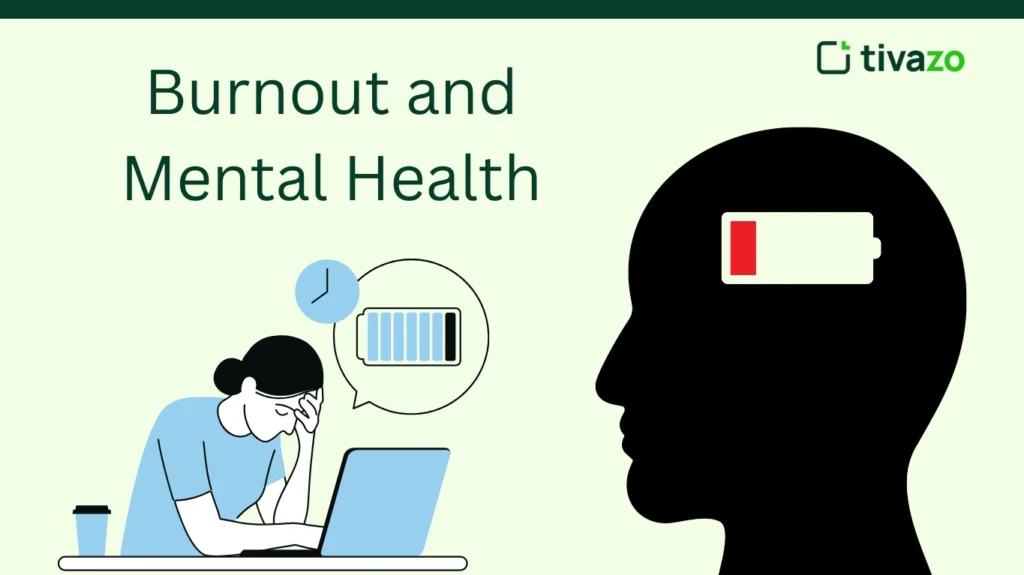
Constant tiredness, mental burnout, despair, or nervousness may considerably influence the punctuality of a worker.
Signs:
- They either sleep too much or do not sleep.
- They have no strength or rather want to get up in the morning.
- They get overwhelmed even when they think of getting their day started.
Causes:
This is not the kind of late showing up, but it is usually an indication of some internal and difficult issues, at least among high-pressure or emotionally taxing work situations, leading to employee tardiness.
3. Transport or Commute Problems
Commuting may be unpredictable in the city or densely populated regions the traffic jam, the failure of the train, and the technical failure of a vehicle as well as bad weather conditions may also take place.
Patterns to Look Out:
- The lateness is highest when the weather is bad.
- Remote workers can also have such problems as unstable internet connection.
Factors:
- Long-distance commutes
- Scarcity of commuting facilities.
- Stiff start work times
Related Article: What does commute to work mean?
4. Family or Personal Responsibility
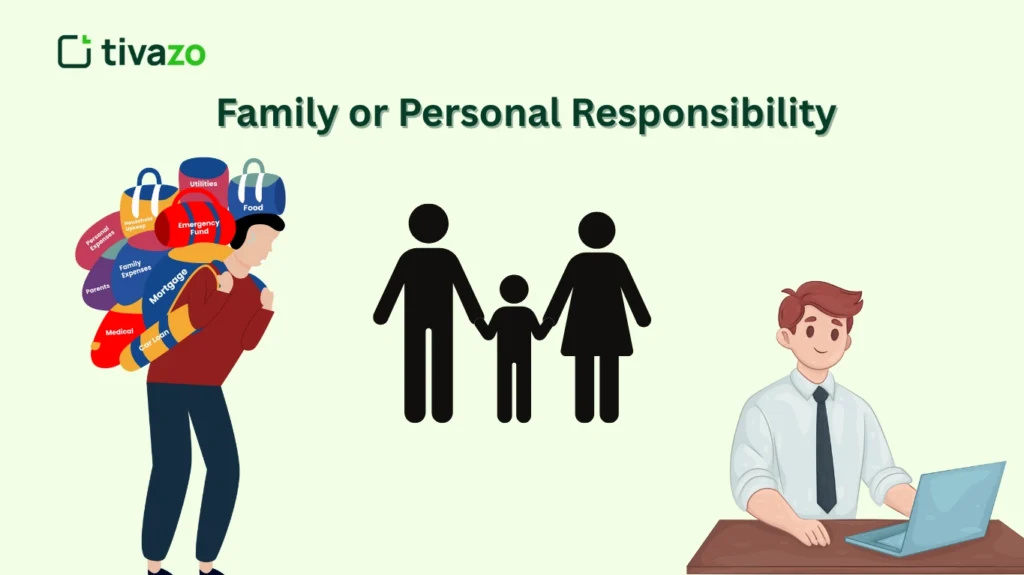
The employees who have to manage going to work with kids, parents, or at home may be caught by surprise, particularly on early mornings, leading to employee tardiness.`
Scenarios:
- A child just falls ill.
- There is a daycare or school that is not open or that opens late.
- An employee has to help a dependent to go away.
The reason why it is important is that it tells the story of a transformed nation in a powerful way using many of the same political buzzwords that are being used today.
Such workers are not bad offenders, they are usually doing their best to manage more than one job, and in an emergency, even a carefully planned project can go wrong.
5. De-motivation or De-engagement
In some cases, lateness is an indicator of emotional detachment. Workers who have lost the feeling of attachment to the work can lose their priority of being early.
Common Signs:
- Meeting apathy or a lack of interest in meetings
- Passive attitude in group work
- The monotony of the absence or lateness without major justifications
Causes:
- Weak leadership or recognition
- Touching hurt or working excessively
- Role-skillset mismatch
5 Signs You Might Be Crossing into Employee Tardiness
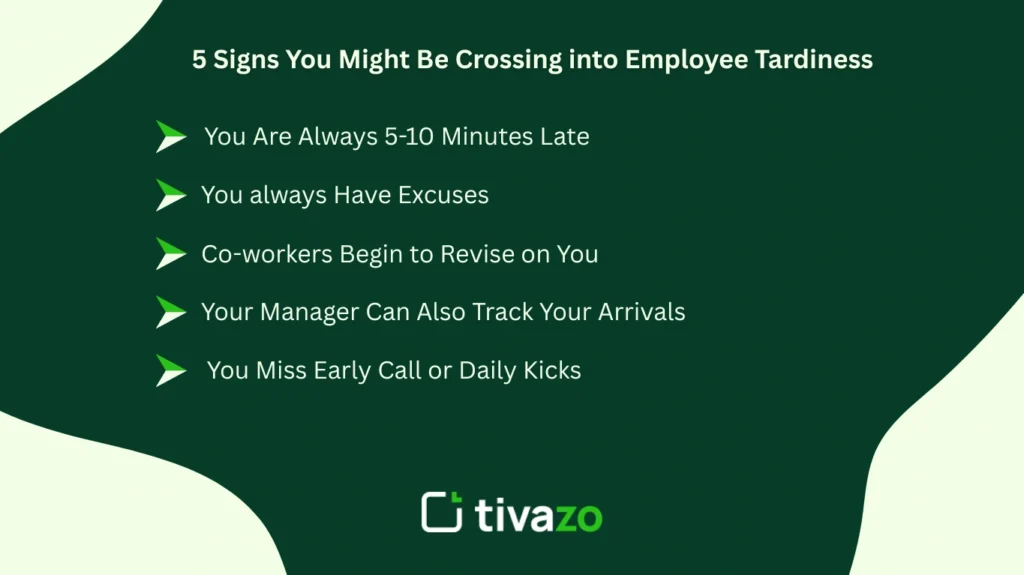
Employee Tardiness does not always begin with big lags. More times than not it snuck up on folks undetected at first – in the guise of little, insignificant, everyday habits that slowly come together and form a pattern. It is important to know that in order to rectify the behavior before it starts impacting your personal reputation, relationships, and performance.
These are the five obvious signals that you are falling into the trap of employee tardiness:
1. You Are Always 5-10 Minutes Late
On the surface of things, the fact that you are a few minutes late does not appear to be a big deal because you could be able to do the majority of your duties. Repeated small lateness, however, is a sign of incompetency, and proves cumulative in the long run.
- Such a 10-minute everyday delay amounts to about one hour of a week.
- It conveys an indirect indication that one can be flexible when it comes to schedules and commitments, at least in your case.
- Subordinates and co-workers will eventually see you as careless or disorganized even though that is not what you are.
What to look out for:
You have become labeled as someone who is always a minute or two late, and people anticipate it, reinforcing the pattern of employee tardiness.
2. You always Have Excuses
We all have bad days: flat tires, alarm accidental shut down, and traffic. However, when you can come out with an excuse after another regarding why you are late all the time, chances are that you are experiencing deeper problems (such as unprofessional planning or you are in burnout).
- Such common excuses take the dynamics of business ownership out of perspective and draw it toward evasion.
- Repeating is an indication of irresponsibility or failure to control oneself and further fuels employee tardiness.
- It makes your professionalism a point of inquiry, particularly under circumstances where the reasons appear to be preventable.
What to look out for:
You find yourself uttering the word sorry because there was bad traffic approaching or you were out of touch with time, at least once or not more than twice a week.
3. Co-workers Begin to Revise on You
When others start accepting your tardiness (arriving late at meetings, pushing delivery dates, or refusing to work early in the day), it is one of the best indicators of chronic employee tardiness.
- It turns into an invisible hindrance in the workflow.
- Others will either get frustrated or resentful and unwilling to confront you.
- Being late does not only affect you anymore because it interferes with productivity and team spirit.
What to look out for:
The arrival of your stay holds up the meetings. What you overhead was: Come on, we will allow them a couple of minutes; they are always late.
4. Your Manager Can Also Track Your Arrivals
Once the manager has started to monitor your presence, be it the actual office time or virtual time in a remote environment, it becomes something more serious than a mere matter.
- This is an indication that your employee tardiness has been observed and it can be recorded.
- Being late may cost you trust or credibility in case it impacts work on the team.
- It may affect you in terms of performance assessment, bonuses, or promotions.
What to look out for:
During 1-on-1 meetings with your manager, they might specifically mention that you showed up too late, or they might use a hint, e.g. by saying, “We should start on time in the future.”
5. You Miss Early Call or Daily Kicks
The trend is that most of the morning check-ins, stand-up meetings or earlier day tasks tend to determine the flow of the remaining part of the day. To miss them is:
- You are not quite in touch with your team.
- You are not involved in important dialogues.
- Others start taking decisions without you and this means they take part in decisions you are also involved in.
What to look out for:
You regularly enter the middle of a meeting or ask questions which had already been tackled. Co-workers also cease to include you into pre-day planning since, well, you are usually late.
How Employee Tardiness Affects the Company
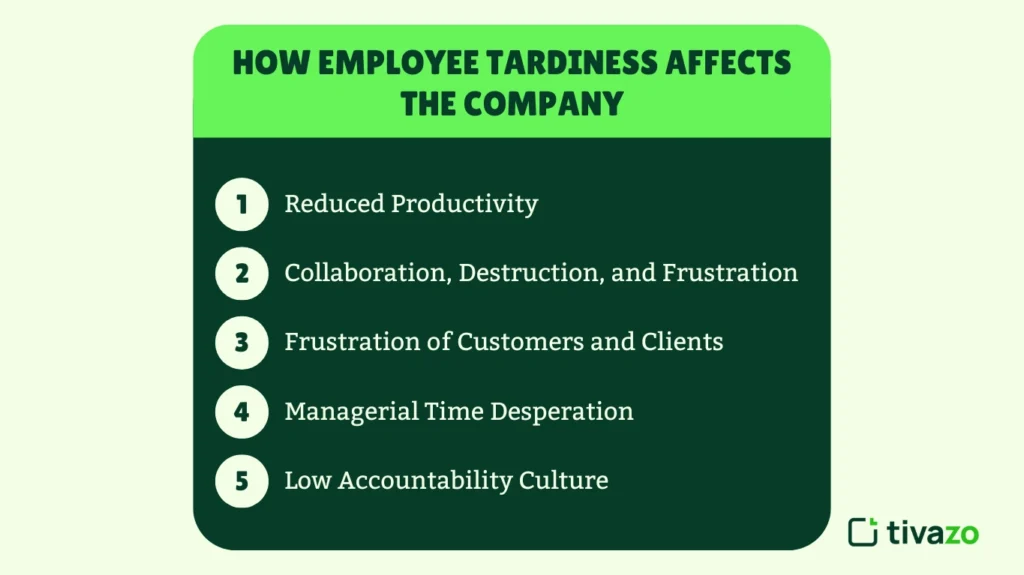
1. Reduced Productivity
Late arrivals of employees at work covertly translate into wasted working hours, which is also a disadvantage to productivity. In case employees report to work late, meetings can either be postponed or delayed, which would fail to meet the timeline of the project. Moreover, submissions of the tasks should be early enough, as they might cause bottlenecks and delay other people who are relying on that work. These minute delays build up with time because they decrease the capacity of the team to behave like a task force in meeting deadlines and achieving objectives. All of this stems from employee tardiness.
2. Collaboration, Destruction, and Frustration
One late employee can be a time wastor in an otherwise working team. The rest of the workers are usually forced to cover up the slack or wait for the tardy worker, which can instill feelings of frustration and resentment. Such a dynamic destroys trust and collaboration, thus striving to get collaboration alleviated. In the long run, employee morale might be affected because employees with a high degree of punctuality will feel that they are not compensated equally, and there will be a lack of cooperation and engagement.
3. Frustration of Customers and Clients
When working with customers /clients, the fact that an employee comes late to work may negatively affect the relations with them, as well as the image of the company. Missing or getting late for appointments can give the business a form of unreliability or unorganized appearance. Clients demand professionalism and promptness and frequent lateness may kill the trust in the company. This may mean a decline in business opportunity, poor reviews, and impaired customer retention.
4. Managerial Time Desperation
They force managers to waste precious time on tardiness solutions such as monitoring employee attendance, reporting lateness cases, and talking to employee about lateness problems. This management cost takes them off strategic leadership functions including coaching teams, developing teams, and performance in the organization. The hours and resources wasted handling tardiness would be well expended towards becoming productive and contributing to the development of the organization.
5. Low Accountability Culture
A culture of tolerance will deteriorate when deadlines and expectations become optional, when tardiness is permitted or left unchecked. This culture centers on the lack of accountability, which easily spreads and promotes a lack of discipline in teams in general. Such an aspect of low accountability will deter high performers and may cause mass disengagement, which will weaken the professional standards and competitive edge of the organization.
5 Ways to Break Free from Employee Tardiness
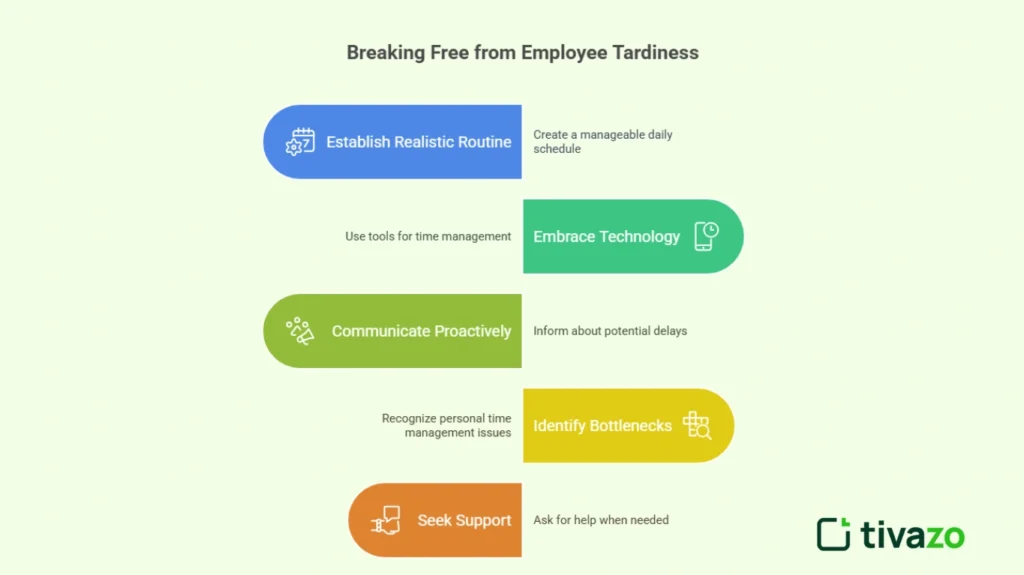
If you are an employee with a problem of lateness or a leader who wants his team to get closer to the problem of lateness, here are five tips to beat the battle of the lateness of employees:
1. Make a Realistic Routine Established
The most efficient strategy against lateness can be creating your daily routine, which is plausible both in terms of your lifestyle and professional needs. This is to wake up earlier so as to have more margin in case something delays in unexpected ways, like traffic or last-minute chores. Research has shown that planning a work the day before can make the morning flow smoothly and help a person relax without worrying. Routine helps create momentum and once it becomes a habit, you are not in a hurry to be on time.
2. Embrace the Technology for Time Awareness
The final favor is to use modern technology to keep in touch with your schedule. To avoid oversleeping, it is advisable to set as many alarms as possible and utilize the calendar and productivity apps to plan your day. Some of these techniques include time-blocking, in which you assign yourself a certain time block that can be utilized on the activity you are doing. There are also notifications about the meetings or deadlines sent to many apps that give light reminders so that you are not late.
3. Communicate Proactively
In case you feel you are going to be late, you should inculcate a habit of communicating with your manager or team. A courtesy of giving them advance notice in advance demonstrates dependability and appreciation of their time. Teams also have the ability to adapt their plans, as they see fit, reducing the number of disruptions. Open communication will keep the relationship in check and will portray you as a person who feels about what he/she has said even in situations where things turn dysfunctional.
4. Find Out Your Personal Bottlenecks
It is important to look at the real reasons why you are late so that solutions are found to the problem. The usual bottlenecks could be an overload of traffic, a distorted sleep schedule, or an emergency at home. When you know what exactly makes you late, you may adjust to it by analyzing the ways to improve them just like starting earlier to commute to work or sleep better or plan the chores to do earlier, etc. The beginning of substantial change consists of self-awareness.
5. Find Support when Required
In some cases cardinal lateness may be symptomatic of underlying problems such as burnout, psychological health or work-life distortion. In case you want to hear this, you should not be afraid to find support. Talk privately to your HR department, a trusted supervisor or an advisor who may provide guidance and referrals. Solving the underlying issues will alleviate stress and produce a healthier environment where punctuality will be less difficult.
Final Thoughts
Employee Tardiness might appear to be a minor problem, but it affects the productivity of the workforce, team spirit and corporate culture in a broad spectrum. Luckily though, it can be an aspect that can be fixed through awareness, communication, and discipline.
Time is a resource in any modern organization, it has to be valued, used, and guarded against wastage. As a manager, or even as a self-employed person, you are the first to set a time-sensitive culture.
